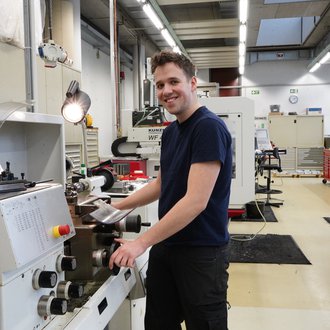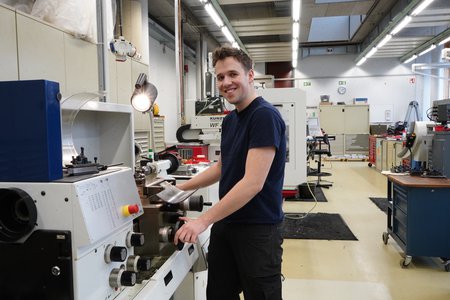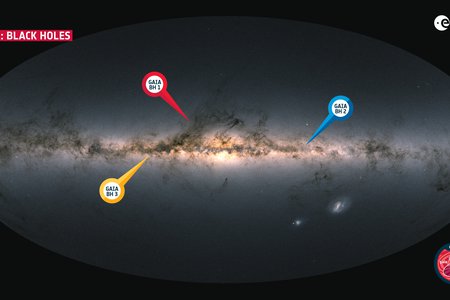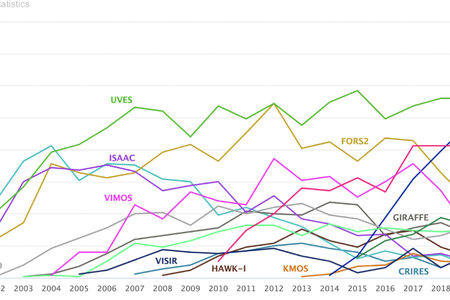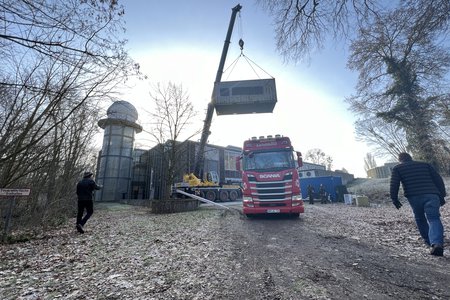The art of filing, drilling and milling - a precision mechanic talks about his time as an apprentice
Newly qualified apprentice Oskar Sauerbrey speaks about his training as a precision mechanic at AIP in an interview. Two new apprenticeships will be available again from September 2024; applications can still be submitted until June.
The Leibniz-Institute for Astrophysics Potsdam (AIP) is characterized not only by its various research sections, but also by the technical section, which is responsible for the construction and maintenance of modern instruments and historical telescopes. The associated precision engineering workshop regularly trains young people. One of them is Oskar Sauerbrey. He has just completed his precision mechanics apprenticeship in January 2024 and gives us an exclusive insight into his experiences at AIP.
Why did you choose the profession of the precision mechanic?
OS: I used to enjoy crafting various things in our basement workshop.
Why did you decide to do an apprenticeship instead of studying?
OS: During my final year at school, which was in 2020 when the coronavirus wave hit Europe, I wasn´t sure whether an apprenticeship or studying was the right choice for me. I was considering an apprenticeship in the skilled crafts sector or an orientation program at the university. However, I quickly realized that I had very little desire for more online lessons like we had at school and knew that this would be the case during my studies. As a result I started searching for apprenticeships. I came across the profession of the precision mechanic, which sparked my interest. It was clear to me right from the start that I really wanted to work with metal. Therefore the job was a good fit for me.
How did you become aware of the AIP?
OS: I looked on the website of the Chamber of Crafts and Trades to see which companies were offering this apprenticeship, as I knew quite quickly that I wanted to pursue a career in precision mechanics. The AIP stood out because the focus of the training is really on precision mechanics. Unfortunately, this was not the case at the other companies I applied to. For example, I also applied to a plastic injection molding company. There, they rather focused on plastic injection molding. The job description of the AIP simply sounded much more interesting and diverse and therefore appealed to me more.
Could you give some examples, what tasks you have in the first, second or third year of your apprenticeship?
OS: The first year of my apprenticeship was a kind of familiarization phase. You try out the first machining processes such as filing, drilling or milling. In the second year of the apprenticeship, you are then introduced to the machines step by step. Only later you will be allowed to use the new CNC machines (freely programmable, computer-controlled machine tools). I also carried out a lot of apprentice projects during this time. For example, I made a bench vice or a Tesa adhesive tape dispenser in small assemblies and was thus able to further practice the machining processes. In my third year, I also worked on many apprentice projects, but I was also involved in my first projects here at the AIP. I was allowed to mill or turn some components.
What is your favorite task?
OS: I actually like programming on the CNC turning machine. Such turning machines are used to produce rotationally symmetrical objects such as cylinders and cones that are lined up. For production, the contours must be recognized on the basis of a previously created drawing and fed into the machine. The result is a three-dimensional product.
What would you like to tell others who consider to do this apprenticeship?
OS: If you really don´t want to do any manual crafting work at all, it is better to stay away from this apprenticeship. However, no special prior knowledge is required for the field of precision mechanics. If you are not able to work with millimeter precision, you should not put any pressure on yourself, as you will be taught here in the workshop. In any case, you should have a keen interest in the profession and at least some manual dexterity. For example, you can also mention in your application that you like tinkering with your bike or car.
What school grades/requirements are needed for the apprenticeship?
OS: Good grades and a basic understanding of mathematics and physics are a must for the job. I use area and volume calculation, the Pythagorean theorem as well as sine, cosine and tangent every day here at the workshop. At the vocational school, we also often calculate the cutting forces of tools or the hardness of materials. You should be able to do all that.
What makes a good precision mechanic?
OS: In any case, precise and clean work. Carefully checking to make sure that everything has been done as the designer requested on the drawing. If I had to name the three most important qualities, they would be tidiness, a structured approach to the work and staying true to your principles. This means always giving your best and carrying out your work as accurately as possible, as even minimal deviations can lead to major problems or damage to the end device.
What are your future plans?
OS: My initial plan was to finish my training first. That is what I have achieved now. I have now received a one-year contract by the AIP, as is customary here. During this year, I want to find out which other opportunities there are that would suit me. I am not sure yet whether I will apply to other trades and industries that are looking for precision mechanics or whether I will go on to study at a university. If I study, I could get credit for a lot of the things I have already learned here. My goal is to have a plan when my employment contract expires.
We thank Oskar Sauerbrey for the interview.
The precision mechanic apprenticeship at AIP takes three and a half years. From September 2024, two apprenticeship positions will be open again, which you can apply for until June.
Further information
Job announcement:
Training program of the Technical Section:
https://www.aip.de/en/infrastructure/technical-section/technical-section-training-program/
Precision mechanic:
Images
Oskar Sauerbrey at work
Big screen size [1000 x 666, 120 KB]
Original size [3936 x 2624, 1.2 MB]
